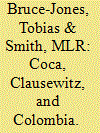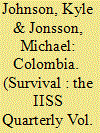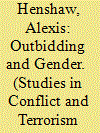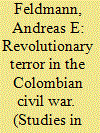| Srl | Item |
| 1 |
ID:
181743


|
|
|
|
|
| Summary/Abstract |
Studies of micro-level violence make various claims to universality: namely, that there are patterns of violence in civil wars that are observable across time and space. The analysis of rebel violence against civilians constitutes one of the enduring themes of these studies. By evaluating the actions of the Revolutionary Armed Forces of Colombia (FARC) during the latter half of the Colombian civil war, this paper demonstrates that the claims of micro-level studies are unable to account for FARC’s violence against civilians. In response, this study provides an alternative framework for understanding FARC’s violence. Informed by the theories of Carl von Clausewitz it is possible to comprehend the logic of FARC’s violence against civilians within a strategic framework that aimed to advance the movement’s political goals. However, it also illustrates that FARC was influenced heavily by its involvement in the drugs trade. The main findings are a) that whilst FARC’s acts of violence may have contained similarities to that of other drugs cartels FARC did not become a narco-guerrilla organization, b) the case of FARC demonstrates that ultimately there are no reproducible patterns in war, micro-level or otherwise.
|
|
|
|
|
|
|
|
|
|
|
|
|
|
|
|
| 2 |
ID:
116654


|
|
|
|
|
| Publication |
2013.
|
| Summary/Abstract |
Is the world's longest active civil war finally coming to an end? In November 2012 the Colombian government and the left-wing guerrilla group Fuerzas Armadas Revolucionarias de Colombia (FARC) began full-fledged peace negotiations in Havana, Cuba. But the mood in Bogotá is ambivalent, with a yearning for peace tempered by a deep-seated distrust of FARC and its negotiating tactics.
|
|
|
|
|
|
|
|
|
|
|
|
|
|
|
|
| 3 |
ID:
191459


|
|
|
|
|
| Summary/Abstract |
The civil conflict in Colombia has gained attention in part for the inclusion of women in rebel forces and peace negotiations between the government and the Revolutionary Armed Forces of Colombia (FARC). Scholarship has often explained the FARC’s decision to mobilize women as both an ideological and tactical move, designed to increase the ranks of the organization and signal commitment to leftist principles. In this paper, I argue that the incorporation of women into Colombia’s civil war is better understood by viewing the country’s various leftist armed movements (including the ELN, EPL, and M-19) through a comparative framework. By applying the theoretical concept of outbidding, I argue that the mobilization and expansion of women’s roles in Colombian armed groups was in fact an intersubjective process, driven by competition among leftist movements existing in a crowded marketplace. In contrast to alternative explanations that focus on mobilization as an elite-driven process, I argue that the outbidding dynamic exposes agency among women recruited to these groups and demonstrates the potential for women to create strategic openings in times of conflict.
|
|
|
|
|
|
|
|
|
|
|
|
|
|
|
|
| 4 |
ID:
164585


|
|
|
|
|
| Summary/Abstract |
This article investigates the use of terror in Colombia's civil war by examining the behavior of the Revolutionary Armed Forces of Colombia (FARC) and the National Liberation Army (ELN). Relying on an extensive database covering 25 years of conflict, the article traces the way in which the FARC and ELN have employed terror as part of their overall insurrectional strategy. I argue that, while ideology plays an important role in inspiring revolutionary terrorism, these groups' terror practices evolved over time and were driven principally by military strategies. Changing conditions in the theater of war, particularly growing competition with paramilitary forces, in turn, influenced these strategies. The article also discusses some interesting differences between the two groups' terror practices.
|
|
|
|
|
|
|
|
|
|
|
|
|
|
|
|